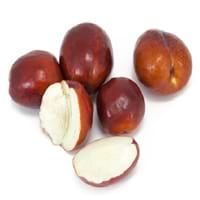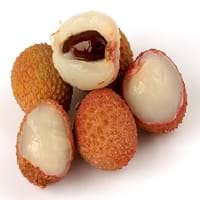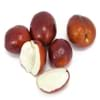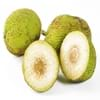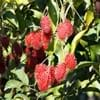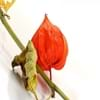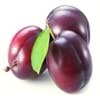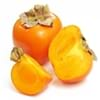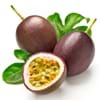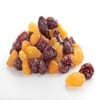Health Benefits
Cancer prevention, Diarrhea treatment, Improves muscular strength, Liver health, Maintains hormonal balance, Reduces nervous tension, Reduces blood circulation problems, Reduces stress, Regulation of heart rate, Treatment of hysteria
Cancer prevention, Cures gastro-intestinal troubles, Heart care, Muscle pain relief, Prevents blindness from diabetes
General Benefits
Anti oxidant properties, Digestive aid, Flu treatment, Helps in weight loss, Strengthens bones, Treatment of common cold
Boosts immune system, Digestive aid, Fights against infections, Helps in weight loss, Maintains healthy cholesterol level, Strengthens bones
Skin Benefits
Heals sunburn, Hydrates skin, Reduces wrinkles, Skin rejuvenation, Skin revitalization
Anti-aging benefits, Skin rejuvenation
Hair Benefits
Promotes longer and healthier hair, Protects hair
Promotes longer and healthier hair, Protects hair
Allergy Symptoms
Abdominal pains, Breathing difficulty, Diarrhea, Hives, Itching in eyes, Itching of nose, Nasal congestion, Redness of eyes, Runny nose, Sneezing, Wheezing
Coughing, Diarrhea, Headaches, Hives, Itching, Labored Breathing, Nausea, Runny nose, Swelling of mouth, tongue or lips, Vomiting, Watery eyes
Side Effects
Decrease in blood sugar levels, Intense headache
May cause abdominal pain, Diarrhoea, Mouth irritation, Throat irritation, Weight gain
Lactating Women
Not Available
Yes
Best Time to Eat
As a snack in the late afternoon, Don't consume at night and before bed, Morning time (before lunch), Strictly avoid empty stomach
As a snack in the late afternoon, Don't consume at night and before bed, Eat the fresh ones, avoid mixing with any other foods, don't eat after meal., Morning time (before lunch), Strictly avoid empty stomach
Vitamin B5 (Pantothenic Acid)
Not Available
Vitamin B9 (Folic acid)
Not Available
Vitamin C (Ascorbic Acid)
Vitamin E (Tocopherole)
Not Available
Vitamin K (Phyllochinone)
Not Available
Lutein+Zeaxanthin
Not Available
Calories in Fresh Fruit with Peel
Not Available
Calories in Fresh Fruit without Peel
Not Available
Calories in Frozen Form
Not Available
Calories in Canned Form
Not Available
Calories in Juice
Not Available
Calories in Jam
Not Available
Calories in Pie
Not Available
Type
Tree fruit
Tree fruit, Tropical
Season
Autumn, Summer
Spring, Summer
Varieties
Honey Jar, Sugar Cane, Li, Shanxi Li, Sherwood, Chico, Silverhill, Tigertooth, Winter Delight and Lang
Emperor fruit, Mauritiu, Sweet Heart, Brewster, Haak Yip and Bengal
Color
Green, Red, Yellow
Bright red, Pink red
Inside Color
White
Greyish-white
Taste
Sweet
Crunchy, Juicy, Sweet
Origin
Syria
China, Indonesia, Philippines, Vietnam
Soil Type
Sandy, Well-drained
Alluvial, Loam, Well-drained
Climatic Conditions
Warm to hot climate
Absence of strong wind, Cold, Dry, Without frosts
Facts about
- Pigment extracted from Indian jujube is used for silk dyeing in Burma.
- In Korea, jujube wood is used to make wind instrument taepyeongso.
- Fresh jujube is known as Chinese apple & dried form is called as Chinese date.
- The seed of Lychee fruit is toxic & can adversely affect the digestive system.
- This fruit gives a smoky flavor when eaten dried.
- This fruit is a symbol of love and romance in China.
Other Countries
Bangladesh, India, Iran, Korea, Lebanon, Pakistan
Australia, India, South Africa, Thailand, United States of America
Top Importer
United States of America
Hong Kong
Botanical Name
Ziziphus zizyphus
Litchi chinensis
Synonym
Ziziphus jujuba or Ziziphus mauritania or Zizyphus jujuba
Nephelium litchi
Subkingdom
Tracheobionta
Tracheobionta
Division
Magnoliophyta
Magnoliophyta
Class
Magnoliopsida
Magnoliopsida
Family
Rhamnaceae
Sapindaceae
Species
Z. zizyphus
L. chinensis
Generic Group
Not Available
Soapberry
Compare Jujube and Lychee
It is important compare Jujube and Lychee as both the fruits have a different nutritional value. Their comparison can be done on the basis of their vitamin and mineral content, calories, benefits as well as characteristics, making it easier for us to choose the best fruit for our diet. Their general health benefits are as follows:
Jujube Benefits: anti oxidant properties, digestive aid, flu treatment, helps in weight loss, strengthens bones and treatment of common cold.
Lychee Benefits: boosts immune system, digestive aid, fights against infections, helps in weight loss, maintains healthy cholesterol level and strengthens bones.
Fruits are also used as a remedy for various hair problems. The hair benefits of Jujube are: promotes longer and healthier hair and protects hair and hair benefits of Lychee are: promotes longer and healthier hair and protects hair. Some fruits are known to cause allergic reactions. The allergy symptoms of first fruit are: abdominal pains, breathing difficulty, diarrhea, hives, itching in eyes, itching of nose, nasal congestion, redness of eyes, runny nose, sneezing and wheezing and the symptoms of second fruit are: coughing, diarrhea, headaches, hives, itching, labored breathing, nausea, runny nose, swelling of mouth, tongue or lips, vomiting and watery eyes. Get sorted Jujube vs Lychee comparison with the help of fruit comparison tool by fruitvs.com.
